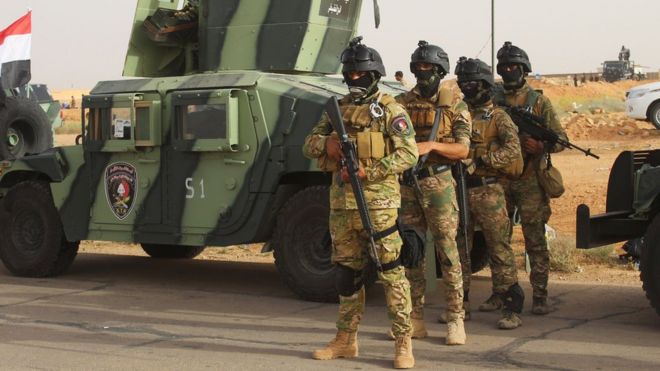By Zachary Lucas
Impunity Watch Reporter, Middle East
BAGHDAD, Iraq — After a two-day battle with the Islamic State, Iraqi forces reported that they had retaken the remote town of Rutba in the Andar Province. This comes on the heels of other military victories against IS in the northern and western regions of Iraq. This string of victories has been followed by some Iraq military officials stating that plans are being made to retake Fallujah next.

Iraqi forces, backed by United States led coalition airstrikes, entered Rutba on Tuesday. These forces were helped by elite commandos and local tribal fighters to retake the city within two days. Coalition spokesperson, Colonel Steve Warren, stated that there were approximately 200 IS fighters in the town. Colonel Warren and Iraqi military officials added that little resistance was made by IS to defend the city.
Rutba was captured by IS in June 2014 and quickly became a home for IS training grounds and bases due to its remoteness. IS used Rutba as staging grounds for attacks in both Syria and Iraq. Colonel Warren stated that the retaking of Rutba will deny IS a “critical support zone” for future attacks against military forces and civilians.
Retaking Rutba is one of a few victories that the Iraqi military has seen in the last few months. In February, the Iraq military retook Ramadi from IS and last month they retook the town of Hit in Anbar province. Coalition forces estimate that IS has lost more than 30 percent of its territory in Iraq and Syria. Some officials have stated that the loss of territory and supplies has led IS to put up less military resistance and instead focus attacks on civilian populations like the recent bombings in Baghdad.
These recent victories and the strategic victory in Rutba, lead many into thinking that Fallujah is next. Both Iraqi military officials and local, allied militia leaders stated plans for retaking Fallujah are in the works. Fallujah was the first city to fall to IS control in 2014 and was later followed by numerous Iraqi military defeats, including losing the second largest city Mosul. Fallujah and Mosul, where IS has headquartered military operations, attacks on civilians, and sex trafficking of women, have been IS strongholds for almost two years.
For more information, please see:
The Washington Post — Iraqi forces retake Rutba from ISIS and eye Fallujah for next battle — 19 May 2016
BBC — IS conflict: Iraq forces retake remote western town of Rutba — 19 May 2016
Radio Free Europe — Iraqi Forces Retake Remote Western Town From Islamic State — 19 May 2016
Reuters — Iraq says it retakes western town of Rutba from Islamic State — 19 May 2016



